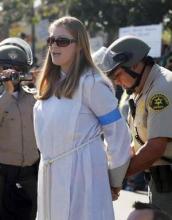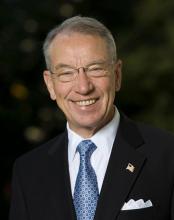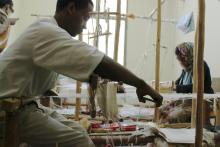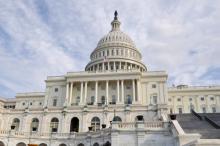Religious groups are giving the payday lending industry a run for their money.
Economic Justice

Across the country, Walmart’s own workers are rising up to challenge the behemoth corporation for its poor working conditions and abysmal wages. As Danny Duncan Collum indicates in “Standing Up to Goliath” (January 2013),” the Walmart workforce is making history by organizing strikes against one of the largest employers in the world.

The discussion we are having about “the fiscal cliff” is really a debate about our fiscal soul. What kind of nation do we want to be? We do need a path to fiscal sustainability, but will it include all of us — especially the most vulnerable? It’s a foundational moral choice for the country, and one with dramatic domestic and deadly global implications. It is the most important principle for the faith community in this debate.
I had a recent conversation with an influential senator on these fiscal issues. I said to him, “You and I know the dozen or so senators, from both sides of the aisle, who could sit at your conference table here and find a path to fiscal sustainability, right?”
“Yes,” he said, “we could likely name the senators who would be able to do that.” I added, “And they could protect the principle and the policies that defend the poor and vulnerable, couldn’t they?”
“Yes,” he said, “We could do that too.” “But,” I asked, “Wouldn’t then all the special interests come into this room to each protect their own expenditures; and the end result would be poor people being compromised, right?”
The senator looked us in the eyes and said, “That is exactly what will likely happen.”
It will happen unless we have bipartisan agreement, at least by some on both political sides, to protect the poor and vulnerable in these fiscal decisions — over the next several weeks leading up to Christmas and the New Year, and then for the longer process ahead in 2013.
But for that to be viable, the arithmetic must work.

A special commission created by the Evangelical Council for Financial Accountability has called for clearer IRS guidance and greater involvement among donors to address “outliers” among congregations and other nonprofits that are not being financially accountable.
Its 91-page report was a response to a request for recommendations from Sen. Charles Grassley, R-Iowa, after he concluded a three-year investigation into alleged lavish spending by six prominent broadcast ministries in 2011.
A low-cost, highly successful rural housing self-help program is at risk from both sides of the aisle. A year ago, the Sojourners article Seven Ways Home described:
the “mutual self-help” model, where families in rural America first qualify for a mortgage, then partner with seven to 11 other families who will all build their homes together.
The model first gained prominence in the Central Valley of California in the 1960s through the work of the American Friends Service Committee (AFSC). The Quaker group had listened to the housing dreams of migrant farm workers, many of whom lived in squalid conditions—30 families might share one rusty faucet. In response, AFSC offered the mutual self-help model: Families would work together to build their homes, with no one moving in until all the homes were completed. This built community as well as housing. The success of this model inspired the formation of Self-Help Enterprises, based in Visalia, California, which has helped more than 5,000 families build homes. The model has been so successful that today some self-help housing is sponsored by the USDA’s Rural Development program.
Now, the Daily Yonder reports that the program is under threat:
Self-Help Housing is unique among the panoply of federal programs. Under it, nonprofit housing developers provide training, technical assistance and close supervision to small teams of future owners who build their own homes. Each family invests roughly 1,200 hours, creating what's known as "sweat equity." Construction professionals do the rest. 502 direct loans finance the debt.
The average annual income of participant families is $27,000. Most are minorities. Their repayment record is better than higher income families.
The key to this success story is the assistance provided to participant families by nonprofits. But instead of increasing funding — or at least holding funding level — the Obama administration’s FY 2013 budget reduces funding for these groups by two thirds..
The House version cuts this program by half.
This classic, highly effective pairing of citizen initiative with governement aid shouldn't be undermined by short-sighted cuts.
Elizabeth Palmberg is an associate editor of Sojourners magazine.

I played the New York lottery for the first time last week.
My $2 ticket didn't win the $588 million payout – surprise, surprise – but it did buy me several minutes of musing, most of it instructive, some of it enjoyable.
I quickly ran out of spending ideas – slightly larger apartment, new computer, clothes for my wife, a car to replace the two we sold when moving to Manhattan. I realized I couldn't even spend the income on a lottery bonanza, unless I started buying things I don't need or particularly want.
...
In the end, I liked the idea of financial security, but saw little to be gained from sudden wealth. In fact, given the misery that tends to befall lottery winners, I might have dodged a bullet by not winning.
After this brief fantasy, I wondered more than ever why the wealthy work so hard to avoid taxes and other obligations of citizenship. Even though their effective taxes are lower than they were during the Reagan years and far lower than during the great prosperity of the post-World War II era, the wealthy are lobbying fiercely to pay even less in taxes. Once again, they seem willing to crash the government for everyone, rather than pay their share of its support.
On Monday, three West Virginia bishops joined by families and advocates pressed the state's politicians to protect poor and working families — or, in other words, the “least of these” — during budget battles in Washington.
The budget and tax negotiations are complex and important. They're driven in large part by the expiring Bush tax cuts and steep across-the-board spending cuts set to kick in if Congress does not act.
Congressional Republicans have been demanding deep spending cuts in programs, including Medicaid and Social Security. They've also defended tax cuts for the wealthy. A number of religious figures say those priorities are backwards.
Felicia Thomas, 24, director at Fort Hill Child Development Center, spoke at the meeting. Thomas is a single mother of a five year old little girl. Federal programs like Earned Income Tax Credit and child care subsidies have allowed Thomas not only to pursue her dreams of a better future, but also to keep the lights on and the fridge stocked.

Earlier this month, I went to vote at our local middle school in North Durham. It was one those winter-tease days, colder than usual, a glimpse of the coming months in North Carolina. As I walked into the school’s auditorium, I was met by poll monitors with visible breath and bundled-up like Ralphie’s brother from the movie A Christmas Story. For a Midwesterner, cold temperatures in North Carolina is a warm day in the fall, nonetheless, it was clear the monitors as well as voters were uncomfortable and frustrated with the conditions. While searching for my name in the voter list, I overheard one monitor pleading with an administrator to get the heat turned on, fearing the cold atmosphere might shoo voters away.
When I left the facility, I couldn’t help but wonder at the irony of the situation. In a crucial election with many issues at stake, including tax fairness, our local voting facility struggled to provide reasonable and comfortable conditions for the voters. It might be unfair to assume that the lack of heat in the earlier morning hours is related to the school’s budget, and subsequently, tax revenue. Perhaps the custodian simply forgot to turn it on. But, as national, state, and local governments continue to cut back on budgets and programs due to the lingering recession’s effects on revenue, the public sector and often those in lower-income neighborhoods are taking the brunt of tax policies and restructuring.

When I think of weavers, what comes to my mind are the ladies in the back of the knitting store in my Southern California hometown, the ones who hang out on weekend afternoons with their handlooms – weaving cloth shawls, blankets, or the occasional modern tapestry.
Here, weaving is, by and large, a pastime. Some would call it an art form. The ladies in the back of the knitting shop are craft weavers. We might consider them "artisans" and laud them for mastering the truly ancient craft.
In the West, machines do most of the commercial weaving, not people. In Ethiopia, and elsewhere in the developing world, handloom weaving is most often an occupation for men and one that isn't usually heralded for its artistry. Weaving isn’t a prestigious job and, by and large, those who weave are the working poor.

THE MEDIA UNIVERSE has been dominated for months by election coverage. Meanwhile, out there in America, something has been happening that could, in the long run, be much more significant than any election. The Age of Walmart may be coming to the beginning of its end.
Cracks in the big blue hegemony have been showing up here and there for the past few years. The bribery scandal involving Walmart's Mexican subsidiary did some damage. So have the grassroots campaigns against new Walmart stores in Denver, Miami, New York, and even the college town of Athens, Ga. In Athens, the anti-Walmart banner has been hoisted by the local alt- rock community. Check out "After It's Gone," a music video attributed to Patterson Hood (front man of the legendary Drive-By Truckers) and the Downtown 13.
But all that was just foreshadowing. In October, here and there around the country, the Walmart workforce began to publicly rattle its chains. The movement started in September in the Walmart supply chain, first with strikes by seafood workers in Louisiana, then warehouse workers in Southern California and Elwood, Ill., all of whom went out because of unsafe or inhumane working conditions. Within a month Walmart "associates" had walked out of stores in Dallas, Southern California, the Bay Area, Sacramento, Seattle, Miami, the Washington, D.C. area, and Chicago. Two hundred of these striking workers demonstrated at corporate headquarters in Bentonville, Ark., during the annual meeting of Walmart investors.

THE LOUISVILLE LOAN Club, which will open early this year at a storefront in a poor residential neighborhood in southwest Louisville, Ky., is a new economic justice ministry blessed and supported by Jeff Street Baptist Community at Liberty. The brainchild of members Susan Taylor and Andy Loving, it's a company that will make small loans designed to counter predatory payday lenders. Typical payday lenders offer short-term, unsecured loans at interest rates of up to 400 percent or more per year. Average loans are $250 to $500, but many borrowers are not able to pay back the principal and interest at the end of the first loan; instead, they become trapped in a cycle of loans and fees, eventually paying thousands of dollars.
The Louisville Loan Club will offer loans at an annual percentage rate of 18 percent—and offer a path to breaking the cycle. "Any of us can need a small loan at some point," says Taylor, who will oversee the day-to-day operations of the club. "Surely we can do better for each other than to throw someone in need of a small loan into the proverbial shark pool."
Loving and Taylor are modeling their enterprise in many ways on the Pittsburgh-based Grace Period, a church-started alternative check cashing and cash advance service with a five-year track record, Taylor says, of "offering small loans and helping people learn to save their own emergency funds. They built a model of compassion."

WANT TO PUT money to work for the common good? Your congregation—large or small—has more to invest than you might expect. Here are three questions to get you started.
1. Where does our church bank? "Many churches choose a bank based on proximity to the church or the church treasurer's home," Andy Loving says, but it doesn't have to end there. Approach the finance committee and say, "We want to put our money somewhere that has implications for what we value as a church," suggests Loving. Find a bank that empowers economically depressed areas through brick-and-mortar locations and socially responsible loan practices.
2. Does the bank we're considering provide options for the poor? Where are the branches located? Does it loan to people or businesses who typically don't get approved by mainstream lenders? One institution Loving recommends is Self-Help Credit Union in Durham, N.C., which has locations throughout the state—and also a web-based interface convenient for members outside the area. Another place to hunt for justice-oriented banking is the National Community Investment Fund website, www.ncif.org, which allows you to search by location and banking practices.
"WE DON'T WORK toward justice; we bring about justice through systemic change," says Rev. Cindy Weber, with a fierce and loving smile, when asked how her congregation, Jeff Street Baptist Community at Liberty, seeks justice through reaching out to the community. There is no pride or bravado in her statement, but a firmness that comes from more than 20 years of pastoring a small, community church that actively helps bring about God's peace on earth.
Jeff Street, located in Louisville, Ky., has an active membership of approximately 100 people—a David-sized congregation compared to many mainline or mega-churches. However, the creativity, dedication, and passion of the church's members, manifested in hospitality programs for and with the homeless, have made a giant-sized impact on local economic justice issues. And the congregation didn't stop there; as part of a coalition of area churches, Citizens of Louisville Organized and United Together (CLOUT), the church has made an impression with policy work and community organizing on the state level as well. Jeff Street's commitment to empower poor people has even reached internationally: Members have invested in Oikocredit micro-lending programs to the tune of $180,000.
"We are a church that knows the difference between justice and charity, and also between charity and hospitality," says Weber.
Jeff Street, as members call it, started as the Jefferson Street Baptist Chapel, a worship community that had been meeting for decades at Louisville's Jefferson Street Baptist Center, an outreach to homeless people that is a mission of the Southern Baptist-affiliated Long Run Baptist Association. But when the congregation's head pastor left in 1987 and it promoted Rev. Weber from associate to interim pastor, the move touched off a four-year struggle with the Center's parent organization. The Long Run Baptist Association refused to recognize Weber's leadership because she is a woman—even though, at the time, she was also serving as director of the center. In 1991, the year the congregation installed Weber as permanent pastor, it was told to leave the center. The church kept the name "Jeff Street"—the shortened moniker by which Jefferson Street Baptist Center was known in the nearby Clarksdale housing project and environs—and moved a couple blocks south, into a rehabbed former machine shop on Liberty Street.

ASHEVILLE, N.C. -- In the days following Thanksgiving, there's already Black Friday and Small Business Saturday and Cyber Monday to kick off the holiday shopping season.
Now, a group of charities and corporate sponsors is urging Americans to make the Tuesday after Thanksgiving just as powerful a day of giving to those in need.
It's called #GivingTuesday, and organizers say it's gaining momentum as the holiday shopping season approaches.
"We have two days that are good for the economy. Here is a new day that is good for the soul," said Henry Timms, deputy executive director of strategy, innovation and content of 92nd Street Y in New York City, where the idea was hatched.
There are 800 partners, from non-profits to corporations, including heavy hitters such as Microsoft and Sony. Timms credits the social-media community with growing the momentum.

Speaking of the widow’s offering, Jesus says: “Truly, I tell you, this poor widow has put in more than all those who are contributing to the treasury. For all of them have contributed out of their abundance; but she out of her poverty has put in everything she had, all she had to live on.” (Mark 12:41-44)
Today, families across America will gather round tables full of food. They will hold hands and pray. They will give thanks for the blessings that have come to each member over the past year. Some of these families’ tables will be covered with turkeys, stuffing, cranberry sauce, and yams; symbols of abundant blessing. Others will give thanks over Hillshire Farms sliced turkey sandwiches on Wonder bread; symbols of blessing in the midst of hard slog of poverty. Though their tables are bare, their thanks offerings are full of power. For, like the widow’s offering, Jesus reveres the offerings of the poor.
This Thanksgiving, as your family holds hands and give thanks and as your church packs Thanksgiving dinner baskets, and this Christmas season churches prepare gift baskets for those Jesus called “The Least of these” (Matthew 25:40) we at Sojourners ask you to do one more thing: Take five minutes and handwrite a simple letter to your member of Congress.

John 18:33-37
Delores Williams, wise theologian and teacher, was my colleague when I first came to Union Seminary. She grew up in the South and remembers Sunday mornings when the minister shouted out: “Who is Jesus?” The choir responded in voices loud and strong: “King of kings and Lord Almighty!” Then, little Miss Huff, in a voice so fragile and soft you could hardly hear, would sing her own answer, “Poor little Mary’s boy.” Back and forth they sang – KING OF KINGS … Poor little Mary’s boy. Delores said, “It was the Black church doing theology.” Who is Jesus? “King of Kings” cannot be the answer without seeing “poor little Mary’s boy.”
Jim Wallis, President and CEO of Sojourners, met with President Barack Obama and other key officials at the White House on Friday to discuss the fiscal cliff, and urge a fair budget deal that does not harm the poor and vulnarable. After the meeting, he sat down with Rev. Al Sharpton on MSNBC's Politics Nation to talk about the results of the meeting.
Visit NBCNews.com for breaking news, world news, and news about the economy
Think Progress reports:
Income inequality has grown in nearly every state in the country over the last three decades and continues to climb across the nation, according to new report from the Center on Budget and Policy Priorities and the Economic Policy Institute.
While a slow recovery from the Great Recession for middle- and low-income families has exacerbated income inequality in the short-term, government policies that are preferential to the wealthy and the long-term stagnation of wages have caused significant growth in the gap between the wealthiest 20 percent of Americans and the poorest fifth, the report found. Across the country, the richest 20 percent make eight times more than the average income of the bottom 20 percent, a ratio that didn’t exist in a single state 30 years ago:In the United States as a whole, the poorest fifth of households had an average income of $20,510, while the top fifth had an average income of $164,490 — eight times as much. In 15 states, this top-to-bottom ratio exceeded 8.0. In the late 1970s, in contrast, no state had a top-to-bottom ratio exceeding 8.0.
Read more here.

BALTIMORE — As Congress embarks on high-stakes budget negotiations to avoid the “fiscal cliff,” leaders of the U.S. Conference of Catholic Bishops are warning elected officials not to target programs for the poor and instead raise taxes and reduce defense spending.
“In developing frameworks for future budgets, Congress should not rely on disproportionate cuts in essential services to poor persons,” Bishop Stephen E. Blaire of Stockton, Calif., and Bishop Richard E. Pates of Des Moines, Iowa, wrote in a Nov. 13 letter to the House and Senate.
Blaire and Pates chair the bishops' committees on domestic and international issues, and the letter asks that “poverty-focused international assistance programs” also be spared because they are a small slice of the budget pie, are effective and enjoy bipartisan support.
BALTIMORE — A divided Catholic hierarchy on Tuesday failed to agree on a statement about the economy after a debate that revealed sharp differences over the kind of social justice issues that were once a hallmark of the bishops’ public profile.
The defeat of the document, titled “The Hope of the Gospel in Difficult Economic Times,” followed an hour of unusually intense debate among the 230 bishops gathered here for their annual meeting. It left many of them openly frustrated that the prelates have not made a joint statement about the nation’s economic woes four years after the recession hit.
“This document is dead,” New York Cardinal Timothy Dolan, president of the U.S. Conference of Catholic Bishops, said with obvious disappointment as he brought the gavel down on the debate after it failed to secure the two-thirds majority needed for passage.
